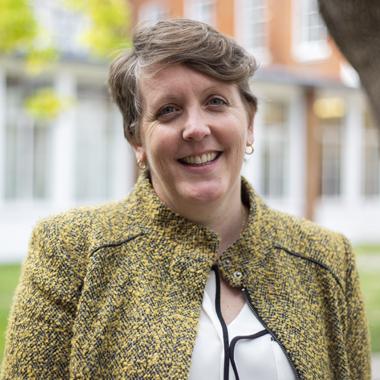Kirsi
"Goldsmiths was a great choice. The campus is big, but does not seem impersonal"
Main details
"I first came to study at Goldsmiths in 1999. I am originally from Finland, but wanted to go to university elsewhere, just because I wanted to experience something different. English and psychology were my favourite two subjects in school so I knew fairly early on that I wanted to study psychology in England.
Choosing where and at which university was not quite as easy. Goldsmiths seemed like the best choice, however, because I had visited the city before and had really enjoyed everything London had to offer. This I felt was very important to keep life interesting outside of academic achievements too. I then visited the British Council in Helsinki and found out more about the universities I was considering and filled out a UCAS application form. Goldsmiths seemed like the best institution out of the ones I had applied to and received an offer of a place for.
Goldsmiths was a great choice. The campus is big, but does not seem impersonal. Academically, it has a good mixture of staff with different areas of expertise. I feel very fortunate that I could do my dissertation and receive excellent guidance in exactly what I was most interested in – the emotional effects of brain injury. The fact that as a Goldsmiths student I was able to use the Senate House Library as well as the Institute of Psychiatry Library was a big advantage.
Goldsmiths felt like a fun place to study too, and it has its own unique character. This I think is based on the great mixture of subjects on offer and the different personalities that they attract. All in all, I had a great time during my undergraduate degree. Apart from studying I had lots of fun and met some fantastic people.
After graduating from Goldsmiths in 2002, I completed an MSc in Rehabilitation Psychology at another university and then worked in psychology-related settings, including brain injury rehabilitation, adult psychiatric care and medicines research. I left London and England in 2004, moving back to Finland. There I worked as an Assistant Psychologist whilst completing my studies to qualify as a Clinical Psychologist. Once qualified, I landed a job in an outpatient clinic for the acute psychiatric care of adults. The work was very interesting and rewarding, but I slowly started to feel like it was time to return to London. I had also toyed with the idea of doing a PhD for quite some time, and decided that if I did do one, it would have to be in London. I was fortunate enough to be able to come back to Goldsmiths and work with the supervisor who had also supervised my BSc dissertation a few years earlier.
My thesis explored the neural determinants of cognitive outcome following traumatic brain injury, focusing on the relationship between abnormalities of the brain’s structural connections and cognitive function. This involved extensive theoretical study and empirical engagement in the fields of neuropsychology, cognitive neuroscience and clinical neurology. Using neuropsychological and neuroimaging methods I showed that disruption by traumatic brain injury of the structural connections is associated with impairments of memory and executive function.
Currently, I work as a Research Associate in the Dementia Research Centre (DRC) at UCL Institute of Neurology where I have particular responsibility for the analysis of longitudinal magnetic resonance imaging (MRI) data from an international multi-centre study (DIAN) to detect the earliest signs of neurodegeneration in familial Alzheimer’s disease (FAD)."

.jpg)
